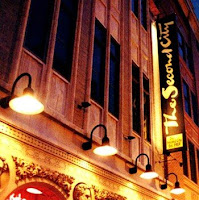The Forum, a group dedicated to applying a customer centric, IMC marketing approach to people-centered leadership, recently held their annual think tank at SecondCity in Chicago. Improv sketches by SecondCity comedians segued into more formal presentationss from Forum members such as Nick Sarillo, Frank Mulhern, and JenniferRosenzweig. The collaborative, entertaining event provided a snapshot of some of the techniques that helped train comedic legends such as Bill Murray, Mike Myers, Stephen Colbert, John Candy, and Tina Fey. One takeaway was a basic improv technique called “yes and.” It reminded me of one of the IDEO brainstorming rules; building on the ideas of others. I decided to do a little research to see what other lessons improv might hold for marketers. Here’s a selection:
“Yes and” vs. “Yes, but”
The idea is to always agree with and build upon what your partner says. “Yes, and” thinking is collaborative, it enables companies to embrace change, to leverage their competencies and capitalize on trends. The “yes, but” thinker digs in his heals and just stays in one spot while the world moves on. “Yes, but” really means no. Think of the record industry’s reaction to Napster vs. Apple’s. Which company would you rather work for?
Trust
Improv requires a certain degree of trust in yourself and in your fellow actors. The environment is welcoming and collaborative. In business, trust means creating an environment where employees are empowered to make their own decisions and not punished for minor deviations (as long as the deviation was made with the company’s best interest in mind). Your employees, are likely very competent and have an acceptable degree of common sense (you hired them, right?) Enabling those on the front line to respond to customer complaints or problems lets them go above and beyond to come up with creative solutions. Zappos is a great example of this. Processes have a place, but oftentimes they become too rigid, turning companies full of people into faceless, robotic enterprises. No one likes to hear “the system won’t let me do that.” Don’t turn your people into the system.
Speaking of personality, it goes a long way. Improv comedians are taught not to force funny and the best ones are able to be themselves, just a little more entertaining. Trader Joes, Whole Foods, Starbucks, even Heinz Ketchup all have authentic voices infused with a bit of “themselves,” yet manage to remain professional and credible. Now think about Jewel-Osco, coffee from your local gas station, and Hunts. Which brands would you rather hang out with?
Involve the Audience
This one is big, especially for social media. Good comedians can gage their audience and adjust accordingly. They ask questions, they involve. Does your twitter feed look like a lecture or a conversation? Do you respond to people’s questions and comments on Facebook? Is the voice you use authentic to your brand personality? If you want people to spend their time with your brand offer them relevance. Respond to what they’re saying with something thoughtful and real. People can tell when they’re talking to a computer. Don’t automate, involve. Social media offers the opportunity to not just teach your customers, but to learn from them. Much cheaper than a focus group, and a lot more honest.
Keep it light
Even if your brand isn’t funny, it can still be fun. If you’ve created an environment of trust, and really understand who you are as a company- your personality, your goals, you’ll know when you can stretch your brand and when you’re just stretching it. Not in a fun industry? Look at ING. They decided that banking doesn’t need to be boring and created ING cafes.
By creating a collaborative environment, playing off the audience, trusting one another, and just being themselves, marketers, like SecondCity comedians can create sellout products that any customer would happily recommend to a friend.
Amanda Weller

No comments:
Post a Comment